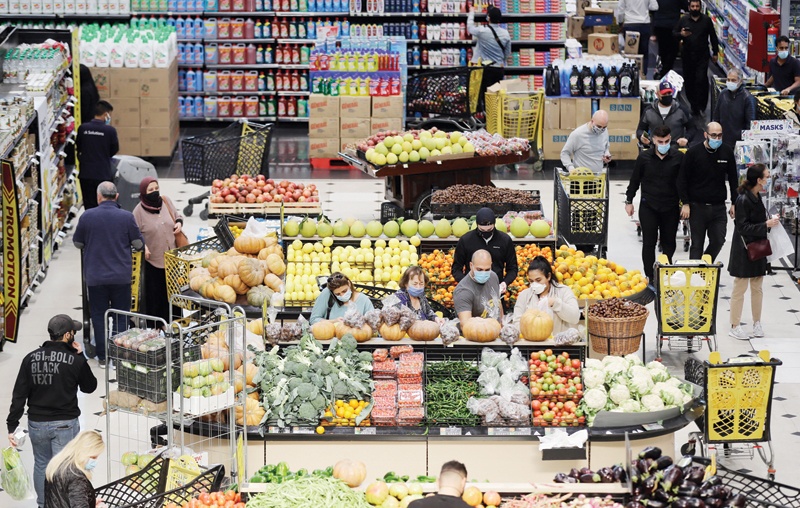 BEIRUT: People shop at a supermarket in Beirut as they stock up on provisions two days before a full lockdown due to the spread of the COVID-19 pandemic yesterday. - AFP
BEIRUT: People shop at a supermarket in Beirut as they stock up on provisions two days before a full lockdown due to the spread of the COVID-19 pandemic yesterday. - AFP
BEIRUT: Lebanon tightened novel coronavirus measures by imposing a total lockdown for an 11-day period and introducing new travel restrictions to stem an unprecedented spike in infections. The latest measures came as officials and health professionals warned that hospitals were quickly running out of beds, leaving many scrambling for treatment, even though a lockdown has been in place since January 7.
"It is forbidden to go out on streets and roads from 5:00 am on Thursday January 14 until 5:00 am on Monday January 25," said a statement, released after a meeting of the Higher Defence Council, the country's top security body. All residents are to remain at home at all times with few exceptions, including health professionals, journalists, those working in the food sector and other essential workers, the statement added. Land and maritime borders will be closed to all travellers except those carrying a valid transit visa.
Travellers arriving from Addis Ababa, Baghdad, Cairo and Istanbul will need to quarantine in a hotel for seven days at their own expense. A total lockdown set to start this week will exacerbate the suffering of vulnerable Lebanese families struggling to make ends meet unless the government offers assistance, a charity has warned. "We recognize the importance of taking thorough measures... but we are very concerned that vulnerable families and their children will be left to deal with a catastrophe on their own," Jennifer Moorehead, Save the Children's Lebanon director, said late Monday.
Lebanon, a country of more than six million, is grappling with its worst economic downturn since the 1975-1990 war. A spiralling coronavirus outbreak has compounded the crisis, forcing businesses shut and denying daily wage earners an income in a country where more than half the population lives in poverty. They must take a PCR test upon landing in Lebanon, and then again six days later.
Private hospitals will be obliged to expand intensive care units dedicated to coronavirus patients to help a strained public sector, the statement said. Supermarkets will remain open, but only for delivery. Rumors they would be forced to shut completely sparked panic buying across the country on Monday, with crowds clearing supermarket stocks.
'Tragedy'
Lebanon, a country of more than six million, has recorded 222,391 Covid-19 cases, including 1,629 deaths, since February. Over the past seven days, it has seen a 70 percent increase in infections, placing it among the countries currently experiencing one of the world's steepest virus upticks, according to AFP data. Firas Abiad, the head of Lebanon's main coronavirus hospital, said the country recorded more than 30,000 new cases between January 3 and 10, hitting a peak of 5,440 new infections on Friday.
Overwhelmed by the influx of new patients, hospitals have had to turn people away, sending many families into a desperate hunt for hospital beds. One hospital at the weekend said it was treating patients in cars because it had reached capacity.
"The tragedy we are seeing in hospitals requires drastic measures," President Michel Aoun said on Monday. Outgoing premier Hassan Diab said the outbreak had "spiralled out of control" and warned the country's healthcare system could "collapse" under the pressure. Cases skyrocketed after authorities loosened restrictions around the holiday season, allowing bars, restaurants and night clubs to remain open until 3:00 am, despite warnings from health professionals.
Money trouble
To stem the rise in cases, the government on January 7 imposed a new lockdown set to run until the start of next month. The measures included a now-defunct night-time curfew. Health minister Hamad Hasan has since called on private hospitals to assist a strained and under-funded public sector in treating COVID-19 patients. Private hospitals, which say they are owed millions of dollars in dues from a bankrupt state, provide more than 80 percent of Lebanon's healthcare services.
But many have refused to treat COVID-19 patients or expand the number of hospital beds available to coronavirus cases until the government settles its debt. Lebanon is set to receive its first shipment of coronavirus vaccines in February from Pfizer-BioNTech. The vaccine will arrive in installments and will cover 15 percent of the population, according to the health minister. Compounding the crisis, Lebanon is grappling with its worst economic downturn since the 1975-1990 civil war. - AFP




